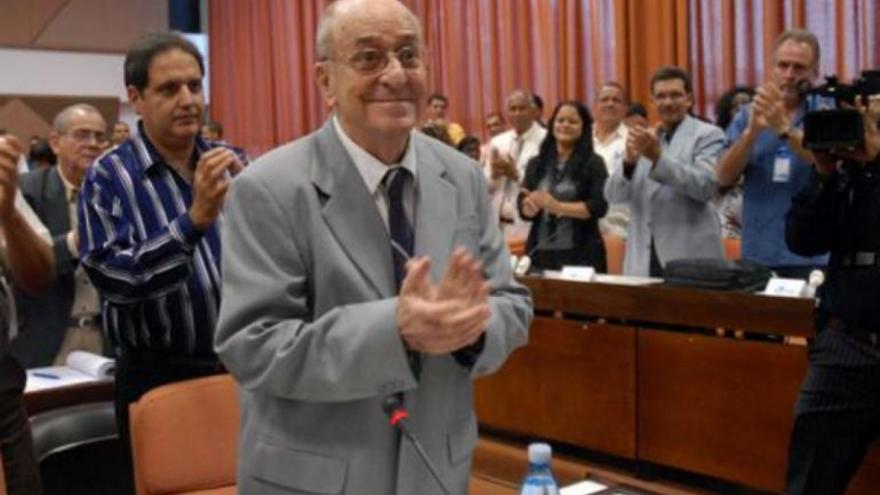
![]() 14ymedio, Havana, September 30, 2018 — The ex-attorney general of the Republic, Juan Escalona, known for the high-profile trial of General Arnaldo Ochoa, died Friday in Havana of bronchopneumonia. Escalona was 87 and found himself retired eight years ago when he was “liberated from his position” after more than 20 years as Attorney General.
14ymedio, Havana, September 30, 2018 — The ex-attorney general of the Republic, Juan Escalona, known for the high-profile trial of General Arnaldo Ochoa, died Friday in Havana of bronchopneumonia. Escalona was 87 and found himself retired eight years ago when he was “liberated from his position” after more than 20 years as Attorney General.
State television reported his death and emphasized his “example of modesty, honesty,” and “complete dedication to his profession,” as well as his “infinite loyalty” to ex-ruler Fidel Castro. However, dissident political movements and human rights activists remember him for his determined persecution and the criminalization of the opposition.
Escalona was the prosecutor in the trial against Arnaldo Ochoa in 1989, [see subtitled video below] where the general and three other service members were sentenced to execution by firing squad for drug trafficking. The prosector concentrated all of his efforts in safeguarding the figures of the Castro brothers, supreme leaders of the State and the Army.
“Years ago I learned that the fundamental thing is the Revolution. I’m a little piece in this process and at the end one feels sorry for in any case being capable of carrying out a mission as delicate and disagreeable as this one,” said Escalona in an interview with the official newspaper Granma on the trial against Ochoa.
Escalona was considered one of the “historic ones” in power. Born in 1931, he joined the Frank País Second Eastern Front, commanded by Raúl Castro in the mountains of the east of the country. Escalona, a notary in those years, was charged with marrying Raúl Castro to Vilma Espín in the mountain range. In 1959 he was Raúl Castro’s adjutant at the head of the Army and was named chief of the Military Staff of the Western Army.
Before assuming the post of Attorney General, Escalona was Minister of Justice from 1983 to 1990. He also acted as president of the National Assembly of Popular Power from 1990 to 1993. During Fidel Castro’s African campaigns, Escalona played an important role at the head of the leadership of the General Military Staff from Havana.
The Brigadier-General traveled on numerous occasions to Moscow and to socialist countries seeking support for the African campaigns. He was also charged with negotiating the opening of an airport in Guyana for the Cuban army, once they were displaced from the island of Granada.
Part of the legacy of Escalona, which many knew as “pool of blood,” is the law of Obligatory Military Service, imposed in 1963 and valid still today. Escalona also left his mark on the laws of the popular tribunals, the notary profession, associations, civil registries, the new Civil Code, and Decree 87, which permitted the review of the tribunals’ sentences.
Of orthodox thought, he was identified as part of the “hard line” of the Communist Party. During his term as Attorney General he lamented in an interview with the official press that “some comrades” placed in positions with access to hard currency, changed “even the way they dressed.”
“I’m of the opinion that there are some people who don’t believe this process can continue forward much longer and who are creating the personal conditions to get out of this world. We’ve had to confront, and we are still processing, some cases in the famous fight against the rich,” he added.
As state television reported, he received varied honors “for his contributions to the defense of the homeland, his career and loyalty to the revolutionary cause.” At the time of his death he was a member of the Communist Party, whose Central Committee he was a part of from 1980 to 2011.
Note: Escalona is prominent in the subtitled video below. Skip to minute 34 to watch an exchange between him and Arnaldo Ochoa.
Translated by: Sheilagh Carey
____________________________
The 14ymedio team is committed to serious journalism that reflects the reality of deep Cuba. Thank you for joining us on this long road. We invite you to continue supporting us, but this time by becoming a member of 14ymedio. Together we can continue to transform journalism in Cuba.
